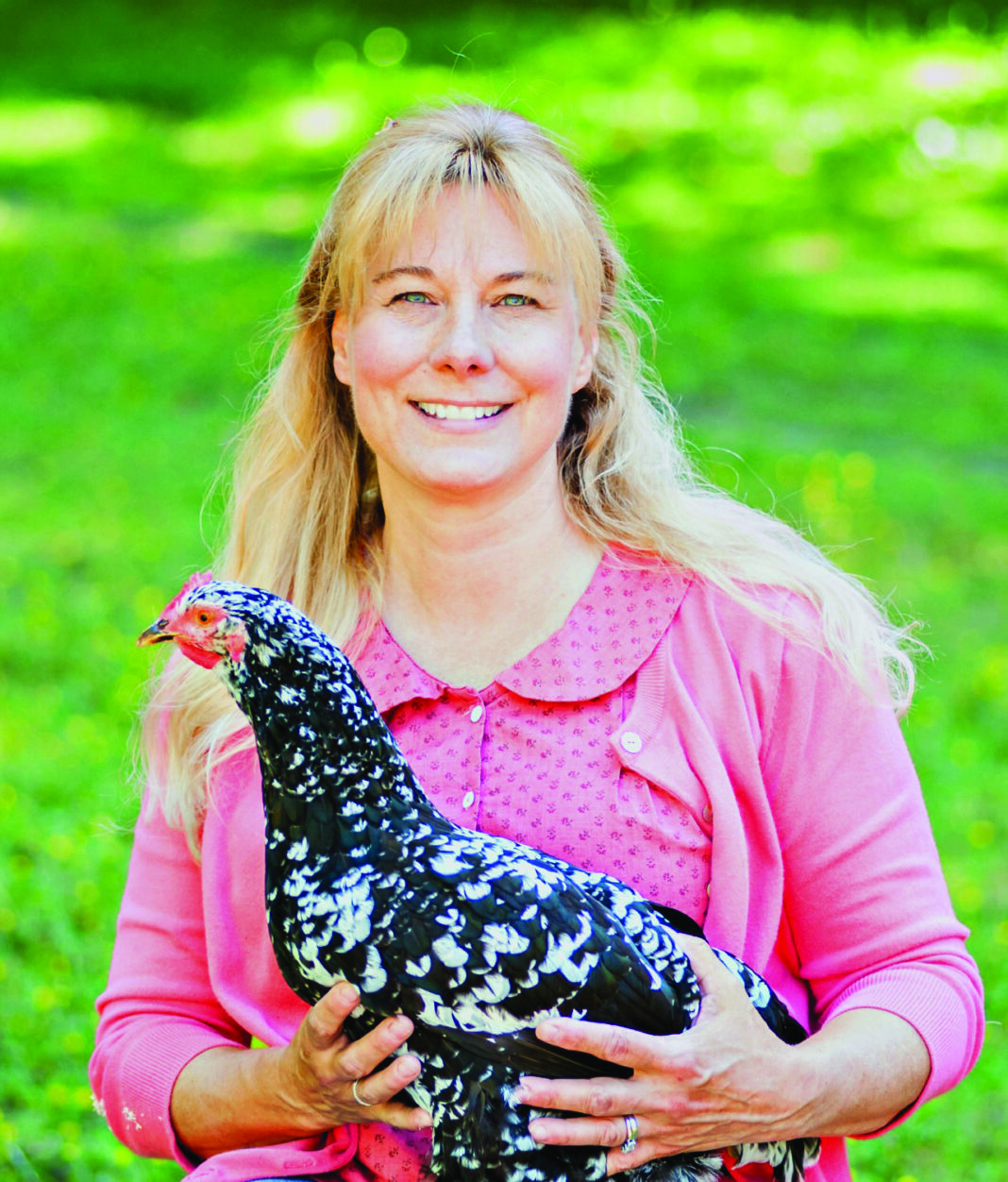By Annie Spiegelman, the Dirt Diva
Fifth-generation chicken keeper Lisa Steele released her latest book, Gardening with Chickens: Plans and Plants for You and Your Hens, this past November. The voice behind the wildly popular gardening blog, “Fresh Eggs Daily,” she directs her nitrogen-rich scrappy flock to gangbuster results in her New England garden.
“This is where the magic begins,” Steele says. “Combining gardening with chickens is a yin-yang practice. A happy and healthy chicken not only supports tastier eggs, but a bountiful veggie harvest as well.”
At her Maine kitchen garden, there are often leafy greens growing as big as salad plates, sunflowers that reach the second story and herbs so rich they sprout a woody stem. The nitrogen-rich fertilizer that only chickens can provide brings big results to a backyard garden. I can attest to this magic. My good friend, Sue, brings me a large bag of chicken crap from her hens, on my birthday each year. Yes, only a gardener could appreciate this gift … anyone else would de-friend her.
Are you from New York City and too chicken to have chickens, like yours truly? No problem. Steele will walk you through step-by-step. She grew up on a small farm right across the street from her grandparents’ chicken farm in central Massachusetts, where she raised chickens and rabbits.
“Chickens and gardening go hand-in-hand,” she says. “Both play an important part in being more self-sufficient and helping feed your family with what you can produce on your land. A garden can provide your chickens with lots of nutritious, inexpensive treats to supplement their regular feed, and save you money, while their activities in the yard can help it thrive.”
The book covers topics such as growing in raised beds, gardens for optimal egg production, gardening for healthy baby chicks (aww!), growing edible plants for you and your flock and creating a chicken-safe yard.
“I find sitting outside in my garden, pulling weeds, trimming herbs or gathering bouquets of flowers so much more enjoyable when my chickens are roaming,” says the author. “Pampered, healthy chickens make hardworking gardeners.”
Just what do chickens do all day? They are natural tillers and aerators. They scratch for bugs, loosen dirt, eat weeds and provide free fertilizer. Free fertilizer? Tell me more! Chickens are master compost spreaders—they love to scratch and turn soil all day long. Steele calls them her own personal team of compact mobile composters, and describes three ways in which they can help. You can integrate chickens with a compost pile, let chickens act as the go-between when it comes to food waste and the garden or help them along to create compost right inside the coop over winter. (Did I mention that you need a chicken coop and a fenced-in chicken run? Well, yes you do. Breathe deeply, New Yorkers. You can do this.)
If you choose to compost right in your chicken coop, this sounds like a win-win plan. All winter long, you barely lift a finger, and then in the spring you clean the whole coop out and have beautiful compost for your garden.The droppings decompose and create heat to keep the coop warm.
“As it decomposes, beneficial microbes grow that actually help control pathogens and keep parasite eggs from developing, making your chickens less susceptible to disease,” writes Steele.
And, for you fellow fertilizer fanatics, Steele shares her recipe for making chicken manure tea. This homemade concoction adds nutrients, enzymes, microorganisms and other good things to plants that might need a bit of a boost or for new transplants. You’ll never need to buy commercial fertilizer again.
Combining chickens and plants may sound like a lot of planning and integration, but Steele’s optimistic tone may just convince you to give it a try. “If you are just getting started with herbs and natural chicken keeping, I would suggest starting small, maybe with just a small patio planter with a few herbs planted in it that can be used for various applications in your chicken keeping.”
I agree. If you are new to gardening, herbs are the simplest way to go, especially if you have lots of sun in your growing space. In high school, I successfully grew basil and parsley on my 11th floor fire escape (adjacent to my big sister’s pot plant, which the neighbors eventually reported to our mom) before I became a California Master Gardener. Besides being the easiest plants to grow, herbs boost a chicken’s immune system, keeping them naturally healthy. Steele recommends specific herbs to boost egg production, improve the circulation or act as a stimulant or a relaxer.
Whether you dash out and get yourself a flock of chicks or not, you’ll find the coexistence of chickens and gardens detailed in this delightful book fascinating.
Learn more at lisasteeleauthor.com.






